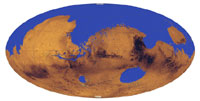Researchers say equal elevation of dry valleys and river deltas points to an ancient Martian ocean
 Mars was once a water world, concludes a new study that dives into the controversy over whether an ocean covered much of the Red Planet’s northern hemisphere early in its history.
Mars was once a water world, concludes a new study that dives into the controversy over whether an ocean covered much of the Red Planet’s northern hemisphere early in its history.
Ever since researchers found hints in the late 1980s that Mars’ northern lowlands are ringed by what appears to be a dried-up shoreline, planetary scientists have debated whether the region was covered by water about 3.5 billion years ago. Now, Gaetano Di Achille and Brian Hynek of the
Researchers say equal elevation of dry valleys and river deltas points to an ancient Martian ocean
Mars was once a water world, concludes a new study that dives into the controversy over whether an ocean covered much of the Red Planet’s northern hemisphere early in its history.
Ever since researchers found hints in the late 1980s that Mars’ northern lowlands are ringed by what appears to be a dried-up shoreline, planetary scientists have debated whether the region was covered by water about 3.5 billion years ago. Now, Gaetano Di Achille and Brian Hynek of the
The scientists relied on altitude data recorded by the now-defunct Mars Global Surveyor spacecraft and on images collected by an array of missions going back to 2001. Di Achille and Hynek estimate that the amount of water in the ancient lowlands would have been enough to fill a 550-meter-deep ocean if spread across the entire planet. That’s about one-tenth the volume of water currently in Earth’s oceans.
Researchers believe any ocean in the lowlands would have to date to at least 3.5 billion years ago, based on the age of the terrain there. The hypothesized ocean would have vanished during an abrupt change in climate, its water either evaporating into the atmosphere, sinking beneath the surface or becoming incorporated into the planet’s polar ice caps.
In a separate study in press at the Journal of Geophysical Research–Planets, Hynek and two
Di Achille and Hynek “do a credible job of integrating a variety of observational lines of evidence suggesting an integrated hydrosphere and large bodies of water” 3.5 billion years ago on Mars, comments planetary scientist James Head of
Jim Bell of
In addition, a decade of spacecraft observations have revealed only small amounts of clay, sulfate and other water-modified minerals on Mars, says Bell. “The relatively minor degree of alteration of Martian surface minerals argues against there ever having been a global, long-lived ocean on the Red Planet,” he says.
“Ultimately, however, the authors are careful to point out that their hypothesis is just that, a hypothesis — a suggestion — that will need to be tested with further observations and models,” adds

 Previous page
Previous page Back to top
Back to top







